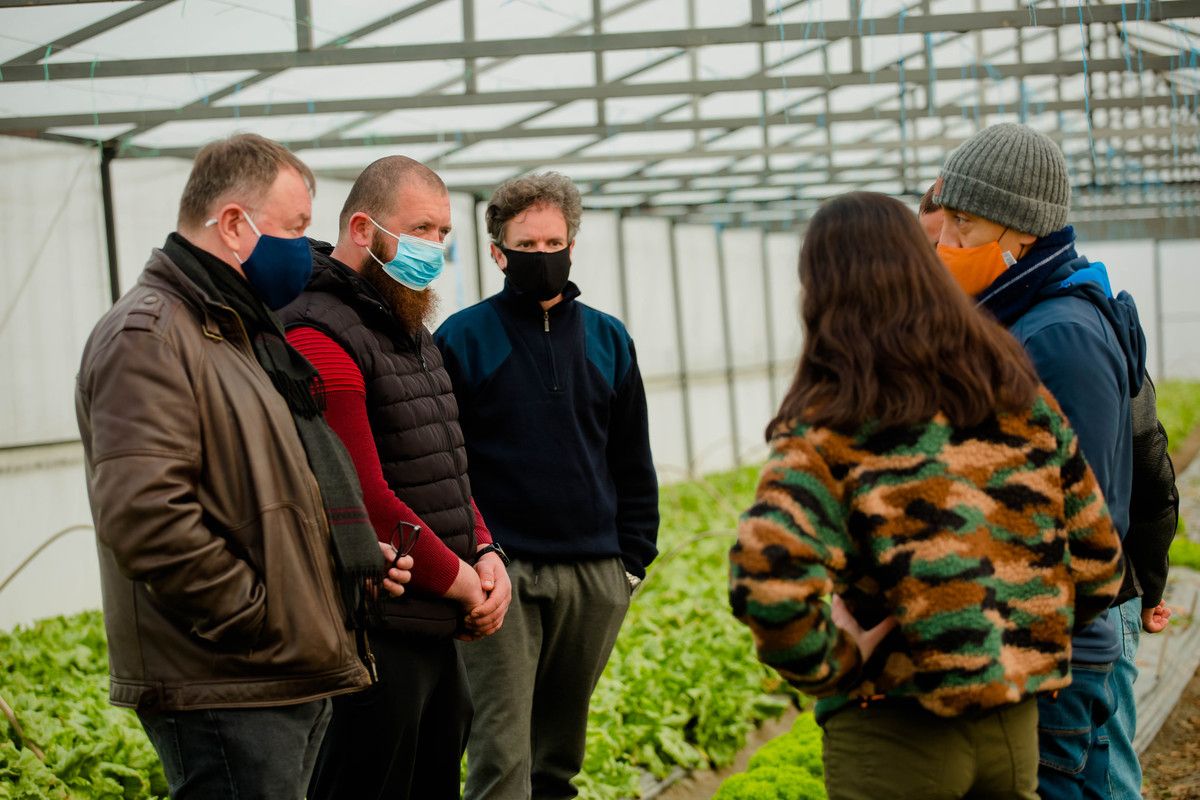
EU and FAO support to Georgian farmers: building resilience amid the pandemic
Introducing modern climate-smart agriculture methods and creating easy access to information are amongst the key priorities of the EU and FAO support to Georgian farmers.
“One of the main things that the COVID-19 crisis has highlighted is the need to build further resilience in the agricultural sector of Georgia,” stated Mr. Georges Dehoux, Programme Manager for Agriculture, Fisheries and Food Safety at the EU Delegation to Georgia visiting several ongoing FAO and EU supported production sites in Akhmeta municipality of Kakheti region.
Lettuce greenhouse production in Koghoto village was selected as a demonstration plot by FAO, under the EU-funded ENPARD programme. FAO specialists used drip-irrigation, mulching and bed formation methods as a part of climate-smart agriculture practices. Among other benefits, this approach demonstrates cost-effectiveness to local farmers. They are able to produce lettuce in the middle of winter, without a heated greenhouse, reaching similar productivity per hectare as in the heated one but at a time when demand and prices are higher.
“We have seen today amazing quality production from a greenhouse. Good enough to take its place on the shelves of any European supermarket and, of course, on the shelves of Tbilisi markets. What is even more impressive is that the lettuce was grown in winter, when it was easier to compete with other producers, due to the lack of offer. This is how we can help to build a Georgian agriculture that is more competitive both on local and export markets,” Mr. Dehoux noted after visiting the demo plot.
‘’EU and FAO support came at a crucial time for my production. Considering the pandemic, it has gotten extremely difficult to start new production, get agronomists’ support or even basic agricultural inputs. If not for the programme I seriously doubt we could have maintained any production this winter or have any income for our families,’’ the owner of the greenhouse, Giga Venjelashvili said.
This new counter season production introduced with the EU and FAO support not only allowed farmers to produce in winter without a significant cost on heating but also reduced the harm to the environment.
The lack of knowledge on the modern approaches in agriculture remains to be one of the biggest challenges Georgian producers face. This issue is particularly problematic for female farmers in Georgia. Under the ENPARD programme, female beekeepers of the Akhmeta municipality received a series of training, provided by the best experts in the field, allowing the beekeepers to expand their productions or even start them from scratch.
“I can’t stress enough how important it is for us, rural women, to have our own independent source of income, especially with this pandemic,” stated Ketevan Bluishvili, a beekeeper from Matani village of the AKhmeta municipality. Ms. Bluishvili approached FAO in December 2020 to create a Farmer Field School, she identified other producers and started a training programme in beekeeping to spread knowledge among other female beekeepers of the area.
Being a community leader, she inspires young women from Akhmeta municipality to start their own honey production, backed with FAO’s support in advice and small equipment. Ms. Bluishvili has already started to look forward, moving from the Farmer Field School to form a local community of honey producers with plans to cooperate under one single brand to take a bigger share of the market.
“Georgian farmers and local leaders have the capacity to share received knowledge in the local communities,” notes Mr. Javier Sanz Alvarez, EU-FAO Programmes Coordinator. “Our priority now is to train more farmers through our Farmers Field Schools, this is the approach when trained farmers can teach others from their communities to reach even more producers. We give the farmers necessary tools for them to produce more, produce better and in a more sustainable way,” Mr Sanz Alvarez noted.
The EU and FAO, under the ENPARD III programme, established more than 40 demonstration plots in various regions of Georgia where the country’s farmers have had the opportunity to observe and learn the best agricultural practices in the field first-hand. More than 700 farmers from all over Georgia participated in training programmes where international and local agronomists conducted a comprehensive training programme through hands-on field training throughout the country. The EU and FAO also develop a funding mechanism to support Georgian farmers against the pandemic. Between March and December 2020, the program awarded 132 matching grants with a total amount of up to 8.5 million GEL to Georgian farmers, entrepreneurs and small and medium businesses in rural areas. In 22 municipalities of Georgia, farmers received drip irrigation kits, agricultural equipment and machinery.
The EU is supporting agriculture and rural development in Georgia through its ENPARD programme. Implemented since 2013 with a total budget of EUR 234.5 million, the main goal of ENPARD is to provide economic opportunities in rural areas and reduce poverty in Georgia. More information on ENPARD is available at: www.enpard.ge.